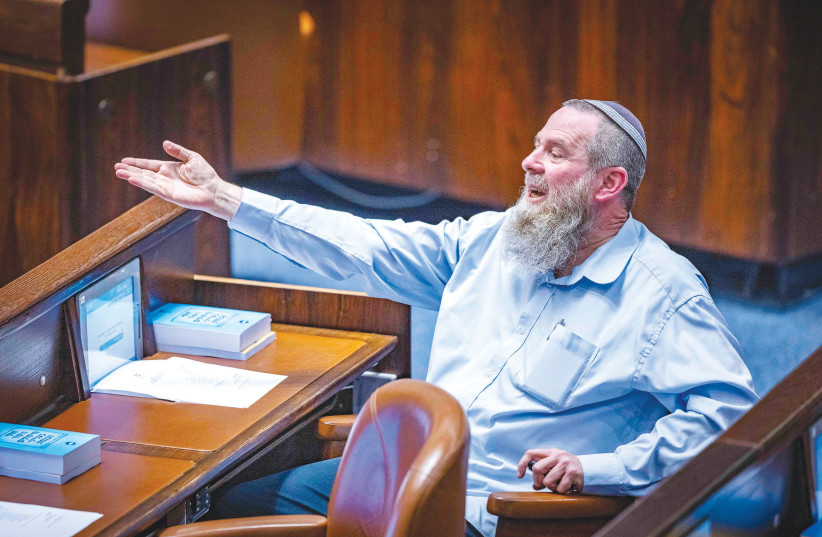by Eliav Breuer
The incoming government will have to deal with an excess of bureaucracy and government spending – and may find it difficult to fulfill its central campaign promise.
 |
Likud party chairman MK Benjamin Netanyahu speaks to the media at the Shaare Tzedek hospital in Jerusalem on November 23, 2022.
(photo credit: OLIVIER FITOUSSI/FLASH90)
|
The final jobs agreement with Shas signed on Wednesday night, and the only remaining jobs to dish out are those of the Likud. Still, the picture of the incoming government is coming into focus.
The outgoing Lapid-Bennett government had 28 ministers and six deputy ministers for most of its tenure – far more than the 18 ministers Lapid promised in his campaign ahead of the 2021 election.
The Gantz-Netanyahu government of 2020 broke records – at its inception, it had 34 ministers and eight deputy ministers, including creative inventions such as the Water Resources Ministry or the Community Affairs Ministry.
Israel's incoming government will be homogenous and right-wing, without any extra rotational or parity demands. And yet, if all of the current ministries stay as they are and no deputy ministers from the Likud are added, the incoming government at its inception will have 34 ministers and nine deputy ministers.
Minimal ministerial growth

The actual number of ministries will not grow by much. The jump in ministers is mostly because a number of outgoing ministers held more than one ministerial position, and partly because of ministries splitting in two. For example, MK Ze'ev Elkin is the outgoing Construction and Housing Minister, Ministerial Liaison to the Knesset and Jerusalem Affairs and Heritage Minister. In the new government this will span at least three ministries: Construction and Housing; Heritage; and the newly named "Jerusalem and Tradition" Ministry.
There will also be at least three "ministers within ministries:" RZP will receive a minister within the Defense Ministry, and Shas will receive ministers within the Interior Ministry and within the Education Ministry.
But while Israel may be used to bloated governments, the incoming government will include large movements of branches within the ministries.
The Education Ministry
The starkest example is the Education Ministry. The Education Minister itself will be from the Likud. However, as the agreements currently stand, RZP chairman MK Bezalel Smotrich will be involved in appointing members of the religious-Zionist educational council; the branch for Jewish Culture will be moved to the National Tasks Ministry under MK Orit Struk; Noam MK Avi Maoz as a deputy minister in the prime minister's office will take over the branch responsible for external programs, and Shas will receive the Israel Association of Community Centers as well as the aforementioned minister within the Education Ministry.
The Defense Ministry will also face a similar problem. The Judea and Samaria Border Police, which was under the IDF's Central Command, will move to Otzma Yehudit MK Itamar Ben-Gvir's newly named "National Security Ministry," and COGAT and the Civil Administration will remain in the defense ministry but under a minister from RZP, and not the actual defense minister who will be from the Likud.
In addition to ministerial branches being moved around, there also will likely be an inflation of branches dealing with similar issues, without a clear delineation between them.
The best examples of this are the issues connecting to authority over religious affairs and Jewish educational or cultural content.
The Religious Affairs Ministry will go to Shas; Struk will receive the aforementioned Jewish Culture branch; Maoz, on top of the external education programs, will lead a new department called "the Authority to strengthen Jewish Identity"; a deputy minister within the prime minister's office from UTJ (likely MK Uri Makleb) will receive control of the Authority for Haredi Development; UTJ's MK Meir Porush will serve as the Jerusalem and Tradition (not Heritage) Minister; Otzma's MK Amichai Eliyahu as Heritage Minister; and in the Knesset, issues of religion and state will be split between RZP in the religious affairs committee and Shas in the Interior Committee.
There is more, but these examples are enough to suggest that the incoming government will have to deal with an excess of bureaucracy and government spending – and may find it difficult to fulfill its central campaign promise, which was to improve the government's ability to govern.
Eliav Breuer
Source: https://www.jpost.com/israel-news/politics-and-diplomacy/article-724358
No comments:
Post a Comment